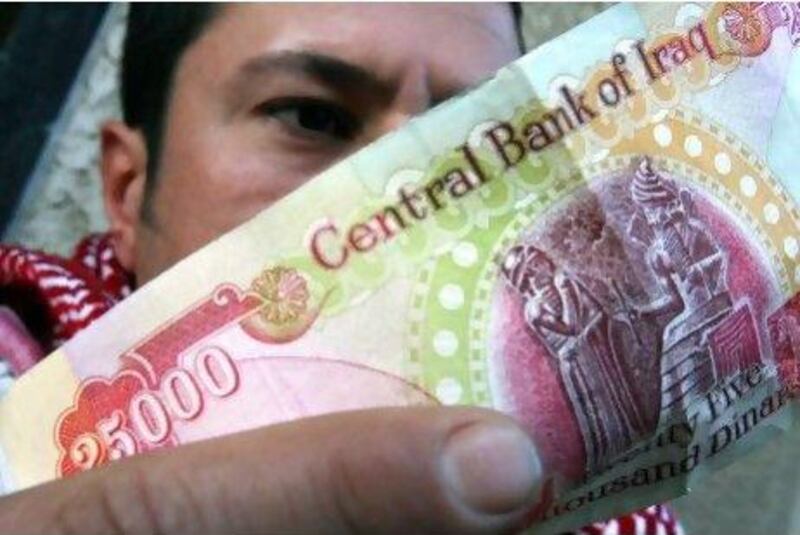Iraq's financial markets are showing serious signs of a recovery after more than a year of depressed activity and malaise.
An Iraqi stock exchange index has rallied by more than 11.5 per cent in the last three weeks and banks are lending more to local companies as the government appears to be stabilising. Trading volumes have risen to between US$2 million (Dh7.34m) and $3m a day, compared with $1m a day last year.
"We were waiting for four years for this point that we are seeing now," said Dara Maghdid, a director at the Iraq-focused Babylon Fund that was launched in September 2006. "Until last month, it was frozen because of security and political problems. Now we think the Iraq Stock Exchange is going to really start to grow."
While the increase in the Iraq Stock Exchange index is significant for the country and its 85 listed companies, the change represents a small amount of actual money changing hands. For instance, the total amount of stock traded last year was valued at 400 billion Iraqi dinars (Dh1.32bn).
Yet investors are beginning to pile millions of dollars into special funds set up to buy Iraqi stocks. Babylon Fund's analysts are predicting a tripling of prices within two years as investment appetite grows alongside Iraq's economy.
Fund managers point to important political developments in October as the catalyst for the rising volumes and prices. Most important was the powerful Shia cleric Moqtada al Sadr supporting Nouri al-Maliki for a second term as prime minister. That move showed potential investors there was some certainty over who would be in charge during the next year. His appointment has since been approved by parliament.
"The political process gained significant momentum after that," said Geoffrey Batt, the managing director of the Euphrates Iraq Fund, which was set up last year in New York. "That seems to have marked a turning point for the country and also for the stock market. Now you are starting to see a significant amount of foreign interest in Iraqi stocks."
Mr Batt said his fund had seen "significant inflows" from investors since it was launched in October. Originally planned as a $5m fund, it may now reach the $40m to $50m size before closing to new investment, he said.
Another major relief for investors was the ability of most of Iraq's publicly traded banks to meet new capital requirements set by the government. There had been a widespread fear that many of them would have trouble, but those concerns appear to be unfounded, said Ahmed Waleed al Fawz, the chief executive of the Iraq-focused Al Fawz Brokerage.
"The market is a mirror of the economy as it is rising up," Mr al Fawz said. "Investors are feeling more confident about the banking sector and who is going to be in charge for the next year. As we say, the economy is a waking giant."
Furthermore, banks have begun to lend directly to companies in the economy in a much larger way after the government cut interest rates on finance ministry bonds.
Bank of Baghdad saw its loan book nearly triple last year and deposits grow by nearly 28 per cent compared with 2009, said Mr Batt. It is one of the top five most traded stocks on the exchange.
"What is really encouraging is that they are starting to lend in a significant way," said Mr Batt, whose firm owns Bank of Baghdad shares. "But the rates for ministry of finance notes have come down substantially and banks are doing what they are supposed to be doing: lending to small and medium-sized businesses."
The top performers in Iraq have been Gulf Commercial Bank, Iraqi for Seed Production, Investment Bank of Iraq, Middle East for Producing and Marketing Fish and Al Khair Financial Investment, according to the ISX website.
Mr Maghdid said there was a growing sense this year could be the "economic year" for Iraq.
With large oil-drilling projects under way, lower levels of violence and signs of strength in the government, the focus is shifting toward the massively underdeveloped economy, he said.





